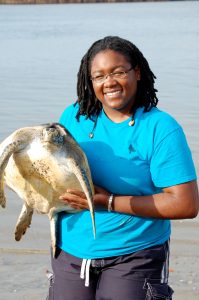When you buy meat at a grocery store, you may have noticed a little round sticker on the packaging telling you that product has been inspected for wholesomeness by the U.S. Department of Agriculture (USDA).
This symbol tells you that the animal the meat came from, and the product itself, was inspected by a veterinarian like College of Agriculture, Health and Natural Resources (CAHNR) alum Dr. Tsa Shelton, MPH, DVM.
Shelton (‘10, ‘15) is currently working as a supervisory public health veterinarian for the Food Safety Inspection Service, Office of Field Operations branch of the USDA, a path that started during her undergraduate career at UConn.
Now, Shelton plays an important role in international food safety. Her daily responsibilities often involve signing off on exports such as pepperoni to Peru or hot dogs bound for Korea.

“The impact that I have is actually really big because the meat I inspect is going all over the world,” Shelton says. “I’m signing off and saying this meat is safe, wholesome, and accurately labeled and packaged for people in another country to eat, or people right down the street.”
Shelton transferred to UConn her sophomore year and was welcomed into the CAHNR community through her work in the lab of Dr. Kumar Venkitanarayanan, DVM, PhD. There she researched the effect of novel antimicrobials on Listeria Monocytogenes, a food borne pathogen.
Shelton was excited to gain hands-on experience working with larger animals like horses and sheep. She fondly recalls hearing cows bellow and horses neigh from her dorm, taking horseback riding lessons, and competing in the Little International Livestock Show where she won second place with a University Morgan gelding named Leo.
“Even though UConn is a big school, I feel like it’s really not that big, especially when you’re in CAHNR where we’re in a little pocket,” Shelton says.
While at UConn, Shelton also worked in the Connecticut Veterinary Diagnostic Laboratory (CVMDL) under Dr. Sandra Bushmich where she performed diagnostic tests on animal blood and ticks.
“It was readily apparent that Tsa had a real knack for this work, and a curiosity about the One Health concept, which is the intersection of animal and human health. She also has an incredible work ethic,” says Bushmich. “We have remained in touch, and I followed her work at the Ohio State University where her passions for veterinary medicine, food safety, and public health coalesced, leading to her current career. I couldn’t be more proud of Tsa.”
Bushmich goes on to label Shelton the “poster child” for the One Health concept. One Health takes a holistic approach, since it acknowledges the connections between humans, animals, and the environment to ensure the well being of the planet and all its residents.
Shelton would go on to earn her master’s degree in public health from UConn Health, where she completed her Masters thesis on passive tick surveillance for Ixodes scapularis (deer tick) and the incidence of Lyme disease in Connecticut. Shelton’s focus on human, animal, and environmental factors exemplifies the importance of the One Health approach, says Bushmich.
During her time at UConn Health, Shelton also worked as a research associate at Yale University, conducting laboratory animal translational medical research.
Shelton left Yale after seven years to further her career in veterinary medicine. “I enjoyed my job, and I was learning a lot,” Shelton says. “But I wanted to know more, make my own decisions and have the knowledge behind me to make those decisions.”
Now Shelton makes decisions that affect millions of Americans every day.
As part of her work with the USDA, Shelton goes on site to poultry, beef, pork, or even bison production facilities. She works with small family-run businesses to large establishments producing meat for food chains and grocery stores.
“I’m learning and seeing something new every day,” Shelton says.
As a public health veterinarian, Shelton is responsible for inspecting the animals before and after slaughter to ensure none of them have any illnesses that can make humans sick. Shelton looks for tell-tale signs of foreign animal disease, other physical hallmarks she learned to identify in her veterinary training at UConn and beyond.
She also supervisors consumer safety inspectors and enforces federal meat, poultry, and egg product inspection laws including animal welfare laws. Shelton is charged with ensuring that establishments are treating the animals humanely and they are not experiencing pain or distress prior to slaughter. She also verifies that meat processing conditions are sanitary to ensure products are safe for consumers.
Shelton may also take samples from the meat to send off for pathogen detection. A national laboratory will test the sample for the presence of harmful bacteria like E. coli, Salmonella, or Listeria as well as antibiotics, steroids, and medicines that are not safe for human consumption. Once these samples come back, if they clear all tests, the product is released to be shipped to stores and restaurants in the US and abroad.
“I like to take pride in knowing that anything leaving the establishments I work in, or my colleagues work in, is safe to eat,” Shelton says.
Her years at UConn and UConn Health prepared her for that important role to ensure global health standards.
“I had a great experience at UConn,” Shelton says. “It really opened my eyes to all the different avenues I could take in veterinary medicine.”
Follow UConn CAHNR on social media



